Table of contents
- Letter from the Board
- Modelica Association
- Vendor news
- Visit the Wolfram Technology Conference 2018
- Modelon July Updates
- MapleSim 2018 Offers New Tools for Developing Digital Twins
- Score Application - Simulation For Everyone
- Siemens PLM Software is proud to announce the release of Simcenter Amesim 16.1
- OpenModelica v1.13.0 Beta1 Release
- Interactive Simulation in OpenModelica with OPC-UA
- DYMOLA 2019
- News from libraries
- Education news
Letter from the Board
Dear Modelica and FMI interested,
The Modelica Association is very pleased about the successful second Japanese Modelica Conference, held in Japan on May 2018. The conference had 3 keynotes, 37 papers, 10 exhibitors and more as 140 attendees, about 25 % from outside of Japan, mainly from Europe and Korea.
As already announced in the last newsletter, The International Modelica Conference will take place now every 2 years in March in Europe. The next one will take place in March 4-6, 2019 in Regensburg Germany (deadline for paper submissions: Nov. 5, 2018). We hope many of you will participate. More details about the conference are available below. In the year between International Modelica Conferences, Modelica Conferences shall be organized on other continents with country specific focus. Besides the conference in Japan, this year the first American Modelica Conference will take place in Boston, Oct. 9-10, 2018. More details about this conference are available below. If you also would like to organize a Modelica Conference, please inspect the Modelica Conference series for instructions.
The MA Backoffice, operated by LTX has started its operation in April 2018 and helps the MA board with administrative tasks (e.g. to fulfill the EU GDPR regulations, organize the FMI crosscheck acounts, create MA stickers, etc.). In particular, the backoffice is now also maintaining a Google calendar (add to ics supporting calendar applications, such as Outlook) about MA activities. If you have dates that should be included (e.g. Modelica or FMI web meetings, or the date of a Modelica User Group meeting), please send an email to the MA backoffice with this information.
All MA projects are very active. As an example, a new version of the Modelica Standard Library is on the way. At the end of June, Beta.3 was tagged that contains 472 resolved issues.
MA is on the way to move nearly all of its infrastructure to Github. In the past, the FMI web page and svn, as well as the Modelica Standard Library svn and issue tracker have been moved. Recently, the move of the FMI cross check results has been finished. In the near future, all remaining issue trackers will be moved from trac to github.
A new MA project will most likely start in the near future: DCP - The Distributed Co-simulation Protocol. This important new standardization activity will strengthen the very successful FMI standard by providing missing functionality for distributed simulations. DCP is a standard that is being developed in the ITEA project ACOSAR. It is planned to publish the ACOSAR results as the DCP standard via the Modelica Association and perform the further development as an MA project. The MA welcomes the new project leader, Martin Krammer from V2C2, and his deputy, Klaus Schuch from AVL.
If you have interesting news for the Modelica and FMI communities, please follow the submission guidelines. The deadline for articles for the next newsletter is Fr. Nov. 16, 2018.
Martin Otter on July 13, 2018
(Chairman of the Modelica Association)
This article is provided by Martin Otter (Modelica Association)
Modelica Association
American Modelica Conference 2018: October 9-10

The American Modelica Conference 2018 will be held at the Samberg Conference Center in Cambridge/Boston, MA, USA from October 9 - 10, 2018. It is organized by the Modelica Association and the North American Modelica Users’ Group (NAMUG).
Registration is open, with early bird discounts available through August 20th at Eventbrite.
This will be the first full Modelica conference to take place in North America, and will meet the high standards established by previous Modelica conferences. As such, this conference will share the latest scientific and industrial progress related to the Modelica modeling language and the Functional Mockup Interface (FMI), and will be attended by a community of users, library developers, tool vendors, and researchers. The call for papers resulted in over 40 submissions, which are currently being reviewed by the Program Committee, and will be presented in two tracks at the conference. The conference will also include an additional track of industrial user-oriented presentations, like those found at typical NAMUG events over the last 5 years, that are not accompanied by a full scientific paper. The abstracts for these presentations will be peer-reviewed by the conference board.
An entertaining social program is also being planned for the conference, with a dinner cruise around the Boston harbor at end of the conference’s first day. This cruise will afford excellent views of local landmarks, including the Seaport District and historic ships in the harbor, and will provide attendees with an opportunity to socialize and unwind in a picturesque setting.
Free Workshops: October 8th
Thanks to the generous support from MERL (Mitsubishi Electric Research Laboratories), NAMUG will organize two free Modelica workshops, Monday, October 8th (before the conference). These workshops will take place at the MERL offices in Cambridge. If you are interested in attending one of these workshops, please select “Workshop Ticket” on the Eventbrite event page. There will be a beginner’s workshop in the morning, and advanced workshops in the afternoon: one with an introduction to modeling of thermo-fluid systems using applications from the Buildings Library and the second on physiology modeling using the Physiolibrary. To aid in planning, please register soon for these workshops since these workshops are conditional on interest and participation.
We are looking forward to seeing you in Cambridge, MA.
Dr. Michael Tiller and Associate Professor Luigi Vanfretti, PhD, General Chair (Xogeny) and Program Chair (Rensselaer Polytechnical Institute)
This article is provided by Christopher Laughman (MERL)
13th International Modelica Conference 2019
The 13th International Modelica Conference 2019 will be held at OTH Regensburg, Germany, March 4-6, 2019. It is organized by OTH Regensburg / Faculty of Electrical Engineering and Information Technology, in cooperation with the Modelica Association.

Conference Venue
The conference will take place at Ostbayerische Technische Hochschule (Eastbavarian Technical University) Regensburg near the center of Regensburg,
only 30 minutes to walk from the historical centre of Regensburg.
Venue Address: OTH Regensburg
Seybothstr. 2, 93053 Regensburg, Germany
The Modelica Conference is the main event for users, library developers, tool vendors and language designers to share their knowledge and learn about the latest scientific and industrial progress related to Modelica and to the Functional Mockup Interface. The program will cover modeling of complex physical and cyber-physical systems, as well as tools, for a wide range of research and industrial applications. In addition to paper presentations and poster sessions, the conference features several Modelica tutorials for beginners and advanced users, as well as vendor presentations, and an exhibition. The previous Modelica conference in 2017 in Prague, Czech Republic, was attended by more than 400 participants from all over the world, and we would like to welcome even more participants to this conference.
Topics:
- Multi-engineering modeling and simulation with free and commercial Modelica libraries (mechanics, electrical, hydraulics, thermal, fluid, media, chemical, building, automotive, aircraft, …)
- Automotive applications
- Thermodynamic and energy systems applications
- Mechatronics and robotics applications
- Medicine and biology applications
- Other industrial applications, such as electric drives, power systems, aerospace, etc.
- Large-scale system modelling
- Real-time and hardware-in-the-loop simulation
- Simulation and code generation for embedded control systems
- Simulation acceleration by use of many CPU cores or GPU cores
- Applications of Modelica for optimization and optimal control
- Modelica modeling, simulation and design tools
- Symbolic algorithms and numerical methods for model transformation and simulation
- Discrete modeling techniques - FEM, CFD, DEM (Discrete Element Method), …
- New features of the Modelica language and of FMI
- Experimental language designs and implementations related to Modelica
- Modelica in other application areas (mathematical programming, databases etc.)
- Modelica for teaching and education
- FMI in Modelica and non-Modelica applications and tools
Important Dates
- Jul.30, 2018: Call for Papers
- Nov. 5, 2018: Submission of papers, libraries and vendor presentations
- Dec. 3, 2018: Notification of paper acceptance
- Jan. 7, 2019: Early registration deadline
- Jan.14, 2019: Submission of final papers and libraries, Exhibitor application
- Feb.25, 2019: Late registration deadline
- Mar. 4, 2019: Tutorials (afternoon)
- Mar. 5, 2019: Conference Dinner (evening) at the castle of Emmeram
Conference Fees
- Standard Early: Euro 600
- Standard Late : Euro 750
- PhD Early: Euro 400
- PhD Late : Euro 500
- Student Early: Euro 200
- Student Late : Euro 250
Contact
modelica.org/events/modelica2019
Prof. Anton Haumer, OTH Regensburg (Conference Chair)
For general questions, please send an email to: modelica2019@modelica.org
This article is provided by Anton Haumer OTH Regensburg
Vendor news
Visit the Wolfram Technology Conference 2018
The SystemModeler team will be visiting the Wolfram Technology Conference 2018, come and learn about the latest features in Wolfram SystemModeler and the Wolfram Language.

Other topics include:
- Keep up with the newest tech and best practices in engineering, and explore ways to integrate symbolic-numeric computation, machine learning, visualizations and automated algorithm selection into your workflows »
- Get hands-on experience in data science, working with industry experts to apply automated machine learning, deep neural networks and advanced human-data interfaces to real-world problems »
- Dive into the latest trends and functionalities in a variety of topical areas, from machine learning to advanced geometry, statistics, chemistry and more »
Register now, or click here to read more about the event.
This article is provided by Patrik Ekenberg Wolfram
Modelon July Updates

Just Released: Modelon Model Testing Toolkit 1.1
Modelon’s Model Testing Toolkit is a platform for creating, executing and automating tests of Modelica models. The Model Testing Toolkit comes with an intuitive graphical user interface for easy test creation and local execution, as well as conversion scripts for auto-generation of test suites directly from Modelica code. Model Testing Toolkit comes ready to integrate with continuous integration platforms, including Jenkins.
Model Testing Toolkit 1.1 now includes the following enhancements: 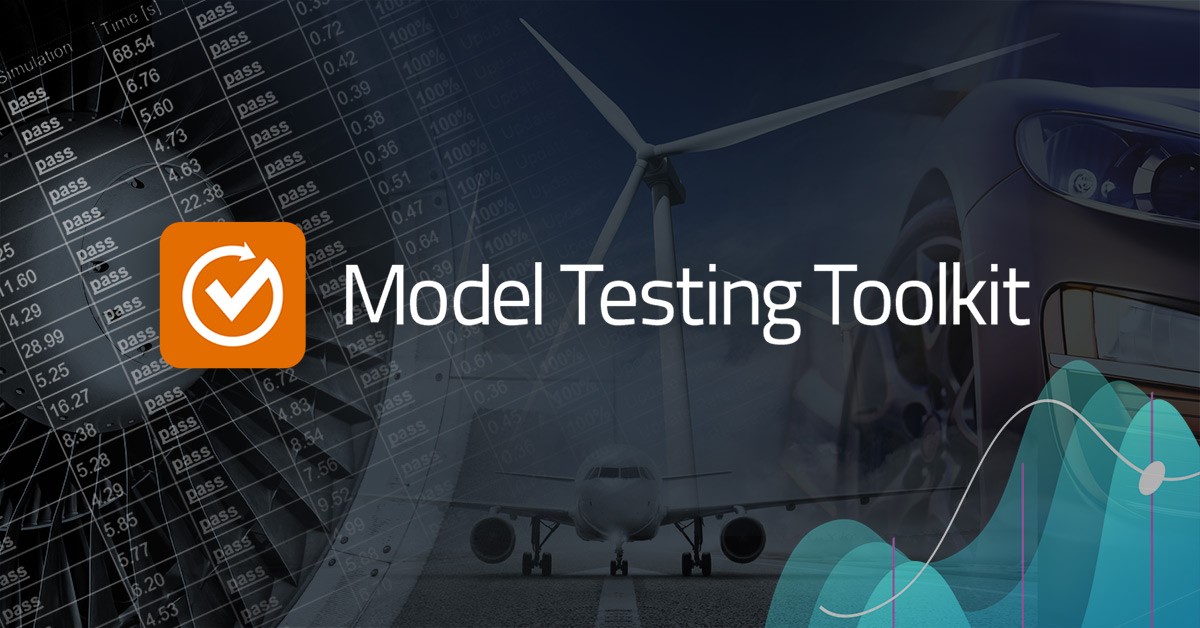
- Support for 64-bit machines
- Support for multiple workspaces within the Model Testing Toolkit graphical user interface
- Support for the 2018.1 version of the Optimica Compiler Toolkit
- Support for the latest versions of Dymola and OpenModelica
- An expanded user guide with integration instructions using Jenkins Pipeline
For more information on the full capabilities of the Model Testing Toolkit, visit the Model Testing Toolkit product page on www.modelon.com.
Just Released: FMI Toolbox for MATLAB/Simulink 2.6.3
![]() Modelon’s FMI Toolbox for MATLAB/Simulink allows users to seamlessly import FMUs into MATLAB and Simulink. Additionally, FMI Toolbox supports all major workflows in control system development and system integration for virtual prototyping, from design and sizing to optimization as well as MIL/SIL/HIL validation & verification for testing.
Modelon’s FMI Toolbox for MATLAB/Simulink allows users to seamlessly import FMUs into MATLAB and Simulink. Additionally, FMI Toolbox supports all major workflows in control system development and system integration for virtual prototyping, from design and sizing to optimization as well as MIL/SIL/HIL validation & verification for testing.
As part of Modelon’s 2018.1 release, FMI Toolbox 2.6.3 now includes the following enhancements:
- Support for MATLAB 2017b
- New FMU block options that allow using custom FMU binaries when using Simulink Coder
- Other improvements
To download a demo version of FMI Toolbox, visit the FMI Toolbox for MATLAB/Simulink product page on www.modelon.com.
To learn more about the 2018.1 release, which includes enhancements to industry-leading libraries such as the Vehicle Dynamics Library, Hydraulics Library, and Pneumatics Library, read the 2018.1 release notes here.
This article is provided by Swati Tyagi, Modelon
MapleSim 2018 Offers New Tools for Developing Digital Twins
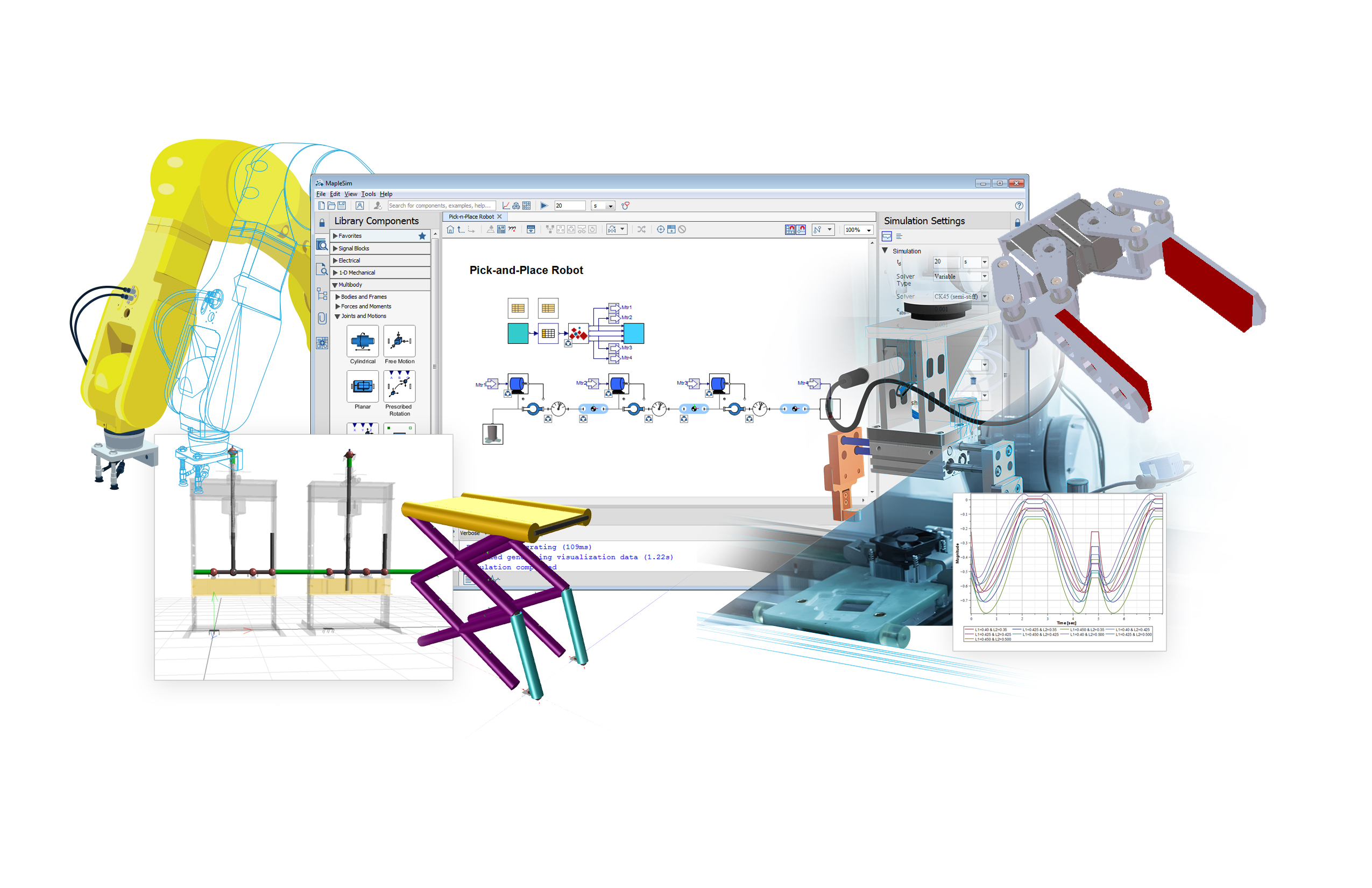
MapleSim 2018 family of products for system-level modeling expands modeling scope and improves toolchain connectivity.
Maplesoft™ has announced a new release of MapleSim™, the advanced system-level modeling tool. From digital twins for virtual commissioning to system-level models for complex engineering design projects, MapleSim helps organizations reduce development risk, lower costs, and enable innovation. The latest release provides new tools for developing digital twins, in addition to greater connectivity with other modeling tools, and expanded modeling scope.
MapleSim is used across a wide variety of applications and industries, including the creation of physics-based digital twins for virtual commissioning. Identifying the optimal motor size required to drive a mechanism is one of the most important goals of simulation with digital twins, and MapleSim 2018 provides tools that make this task easier. The new 1-D Motion Generation App allows engineers to create motion profiles that adhere to defined velocity and acceleration constraints. They can define the desired motion of the joints, and then run the simulation to discover the torques and forces required to create that motion. This information can then be used to correctly size the motors, ensuring optimum performance at minimal cost.
MapleSim 2018 provides greater toolchain connectivity with the ability to import models from even more software tools. With the expanded FMI support, engineers can import models defined using FMI 2.0 Fixed-Step Co-Simulation, as well as FMI Model Exchange. Other improvements include enhanced Modelica support for easy access to more 3rd party component libraries inside MapleSim. In addition, the MapleSim Heat Transfer Library from CYBERNET offers improved tools for studying heat transfer effects and preventing overheating, while the MapleSim Hydraulics Library™ from Modelon and MapleSim Pneumatics Library™ from Modelon add-ons can both now take into account temperature effects during simulations.
This article is provided by Tina George, Maplesoft
Score Application - Simulation For Everyone
The new XRG Score release enables multi-physics simulations by using the „Functional Mock-up Interface“ version 2.0. Score is supplied as an Microsoft Excel Add-in which makes the exchange of simulation data very easy. Simply everyone who has an Excel license can read, change or prepare values for simulation in the same file. This helps to deploy work from Modelica users to other colaborators.
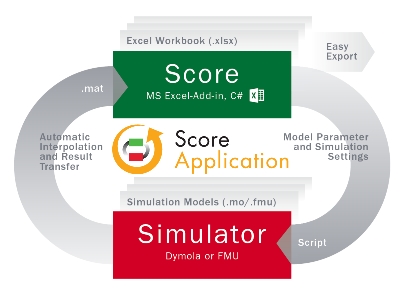
Furthermore, the XRG Score transfers Dymola or OpenModelica results files and lets you filter and interpolate them. Score transfers parameter tables created in Excel to Dymola scripts and lets you start Dymola directly over an interface to run simulations and import the results. Our Score Application allows you to define and save all your simulation settings and any results you require in a workbook. You can run, import and report on any number of simulations over one of these workbooks. You can automatically transfer the results in Excel spreadsheet templates along with integrated charts and formulas.
More technical features of Score:
- Multi-Threading (parameter sweeps on multiple CPU cores)
- Automatized simulation process
- Import, filtering and interpolation of complex result files (Dymola, FMU and OM) in Excel
- Template reports
- Broad support of MS Office versions through COM add-in
This article is provided by Stefan Wischhusen XRG Simulation GmbH
Siemens PLM Software is proud to announce the release of Simcenter Amesim 16.1
Simcenter Amesim 16.1 provides a high-quality support of the Functional Mock-up Interface (FMI)
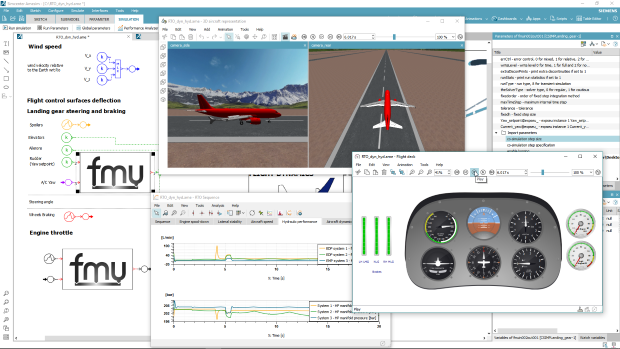
Simcenter Amesim 16.1
- Complies with all existing discrete and continuous FMI 1.0 and 2.0 coupling modes.
- Can be used as master or integration platform for Functional Mock-up Unit (FMUs).
- Can manage multiple instantiations of the same FMU (if supported by the FMU itself).
- Can import and mix multiple FMUs: 1.0, 2.0, model exchange and co-simulation.
- Can export FMUs that support variable-step co-simulation.
- Can automatically generate a standardized HTML documentation for all its exported FMUs.
- Can generate “binary-only” FMUs embedding all the tables they need, for more IP protection and user-friendliness.
- Allows users to fine-tune which parameters and variables to be exposed by exported FMUs.
- Can export FMUs with both the 32-bit and the 64-bit binaries to ease model sharing via FMI.
- Exports co-simulation FMUs embedding all Simcenter Amesim solver capabilities: through dedicated exposed parameters, one can for instance switch from variable-step to fixed-step solver directly from the importing tool’s interface, with no need to re-export the FMU.
- Can export 2.0 FMUs for model exchange or co-simulation that provide their directional derivatives. Thus the recognized frequency analysis capabilities of Simcenter Amesim can be used within advanced master or importing environments.
- Can directly export “source-code FMUs” for specific FMI compatible multi-core real-time targets, which avoids the use of proprietary middleware to assemble the complete model, or create the real-time application.
More will come in future releases with other powerful FMI capabilities and usability improvements. Stay tuned!
See also: Why you should upgrade to Simcenter Amesim 16.1 on our Simcenter blog and for more information on Simcenter Amesim, please visit our website.
This article is provided by Bruno Loyer (Siemens PLM Software)
OpenModelica v1.13.0 Beta1 Release
OpenModelica is the most complete open-source Modelica-based cyber-physical mathematical modeling, simulation and optimization environment intended for industrial and academic usage. Its long-term development is supported by a non-profit organization – the Open Source Modelica Consortium OSMC with many company, institute, and university members.
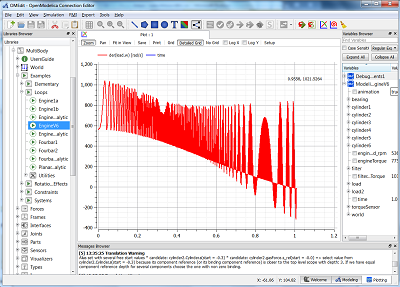
The figure shows OpenModelica with a plot from a simulation of the V6Engine model.
The current OpenModelica development is focused on OpenModelica v1.13.0, for which a Beta1 release is planned at the end of June, 2018. Some of the main new items in this release are the following:
- Replaceable library GUI support.
- OMSimulator v2.0.0 – the second release of our efficient FMI Simulation tool including a GUI for FMI Composition and co-simulation, as well as transmission line modeling
- Improved OpenModelica DAEMode for efficient solution of large Modelica models.
- Matlab scripting API to OpenModelica.
- Julia scripting API to OpenModelica.
- OMSysIdent - parameter estimation module for linear and non-linear parametric dynamic models.
- Interactive simulation and control of simulations with OPC-UA.
- PDEModelica1 - experimental support for one-dimensional PDEs in Modelica.
- Analytic directional derivatives for FMI export and efficient calculation of multiple Jacobian columns – giving much faster simulation for some models
- Enhanced OMEdit – including fast multi-file search
This article is provided by Peter Fritzson Open Source Modelica Consortium
Interactive Simulation in OpenModelica with OPC-UA
Interactive simulation and interactive control of simulations is provided in OpenModelica 1.13.0 using OPC-UA, which is an industry standard for industrial automation.
OPC-UA in OpenModelica:
- Controls simulations in real-time
- Changes inputs and state variables on the fly
- Performs interactive plotting
- More lightweight than controlling FMUs for your own simple applications
There are open source OPC-UA clients available in C++, Python, etc.
The video below shows an early prototype of the interactive plotting.
This article is provided by Martin Sjölund (Open Source Modelica Consortium)
DYMOLA 2019
Dymola 2019 was released on June 1, 2018. Detailed information can be found here and the complete release notes here.
Model creation
Dymola 2019 allows you to capture the parameters of existing components to create new models. This encourages the creation of specialized component libraries that can be used in subsequent designs. Improved use of display units for parameters and variables in the graphical editor and in plots improves readability and reduces model ambiguity.
Simulation
To further support the simulation of hard thermo-fluid problems, Dymola 2019 has more robust and efficient handling of models with nonlinear equation systems through improved handling of initial values. Improved diagnostics at compilation and runtime helps find difficult numeric problems, and intermediate values can be checked during debugging. Optimized handling of parameters helps minimize code generation for large tables of data, leading to faster model translation, simulation and post-processing.
Modelica libraries
Our libraries have seen the following enhancements:
- Battery Library: Version 2.1 includes a new pack model that enables the simulation of nested cylindrical cells. Additionally, the thermal model of the cylindrical cells is updated, allowing multiple surface heat ports for an improved simulation of heat distribution in discretized pack models.
- Hydrogen Library: Version 1.1 includes new media and component models for humidity control as well as a control based methane reformation model for PEM.
- Pneumatic Systems library is available in Dymola 2019, facilitating architecture design, component sizing, modeling and simulation of pneumatic systems.
- Testing Library: This release brings improved test runners, changes the visual look of the library and introduces operator records.
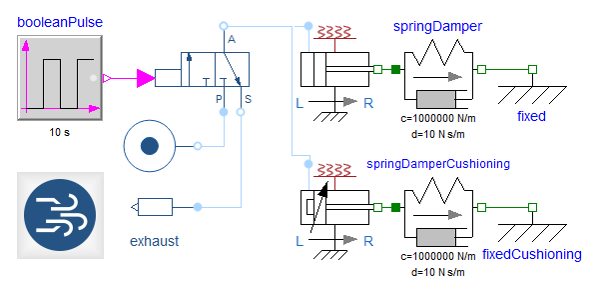
This article is provided by Dag Brück and Dr. Imke Krüger (Dassault Systèmes)
News from libraries
New TIL AddOn Cabin
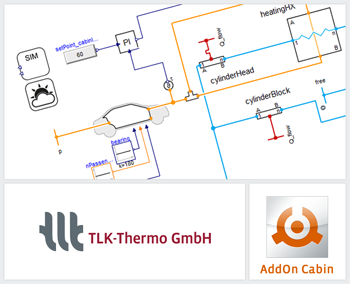
The TIL Suite enables stationary and transient simulations. A new add-on “TIL AddOn Cabin” enriches the model portfolio of TIL:
The Cabin model enables the energy balancing of a cars single air volume and its surrounding components like walls, windows and built-in components. Furthermore, inner and outer thermal effects, the air conveyance separated in fresh and circulated air and the moisture ratio, influenced by the passengers’ water production are considered. Besides that, the human energy balance and the comfort level (PMV/PPD) will be calculated, based on a 1-node air cell model.
For further information see www.tlk-thermo.com, download the TIL presentation or contact us at til@tlk-thermo.com.
This article is provided by Matthias Kwak TLK-Thermo GmbH
Unity FMI Add-on - FMI for Unity
Unity FMI Add-on
The Unity FMI Add-on provides a Functional Mock-up Interface for Unity and allows users to connect their physical models to Unity games and simulations.
After an FMU has been imported into the Unity project by selecting Assets > Import FMU it can be in used in MonoBehaviour scripts:
public class BouncingBall : MonoBehaviour {
FMU fmu;
void Start () {
fmu = new FMU2("bouncingBall");
fmu.SetupExperiment(Time.time);
fmu.EnterInitializationMode();
fmu.ExitInitializationMode();
}
void FixedUpdate() {
fmu.DoStep(Time.time, Time.deltaTime);
transform.position = Vector3.up * (float)fmu.GetReal("h");
}
}
A ready-to-run example scene is included that demonstrates how to instantiate and reset a model, set input and get output.
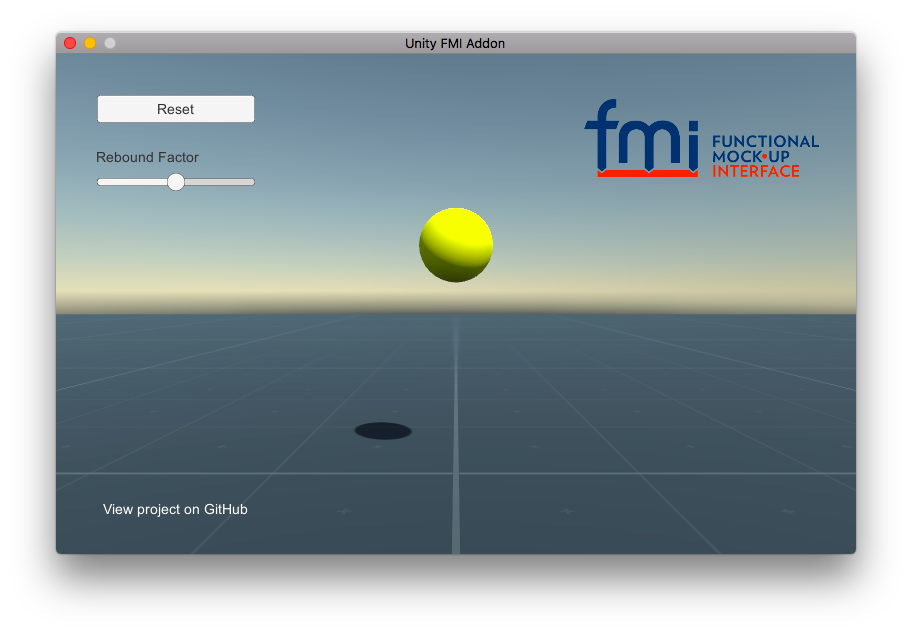
The pre-built player of the BouncingBall scene is available as a download for Windows and macOS. For more information, downloads and issues visit the project on GitHub.
This article is provided by Torsten Sommer (Dassault Systemes)
Education news
New Free Online SystemModeler Course
Get an introduction to model analytics with SystemModeler and the Wolfram Language. This free course shows you how to harness the analytics engine of the Wolfram Language to analyze, simulate and generate Modelica models.

You will learn how to use SystemModeler and the Wolfram Language to:
- Get complete control over simulations, such as being able to programmatically specify initial conditions, parameter values and input signal functions
- Create custom plots of variables, such as 3D plots, animations and sensitivity bands, directly from simulation results
- Programmatically create models, either from physical equations or by connecting and configuring models using scripting
View the course, or click here to find more Modeling & Simulation courses from Wolfram U.
This article is provided by Patrik Ekenberg Wolfram
Training Courses for Modelica and Dymola by LTX Simulation GmbH
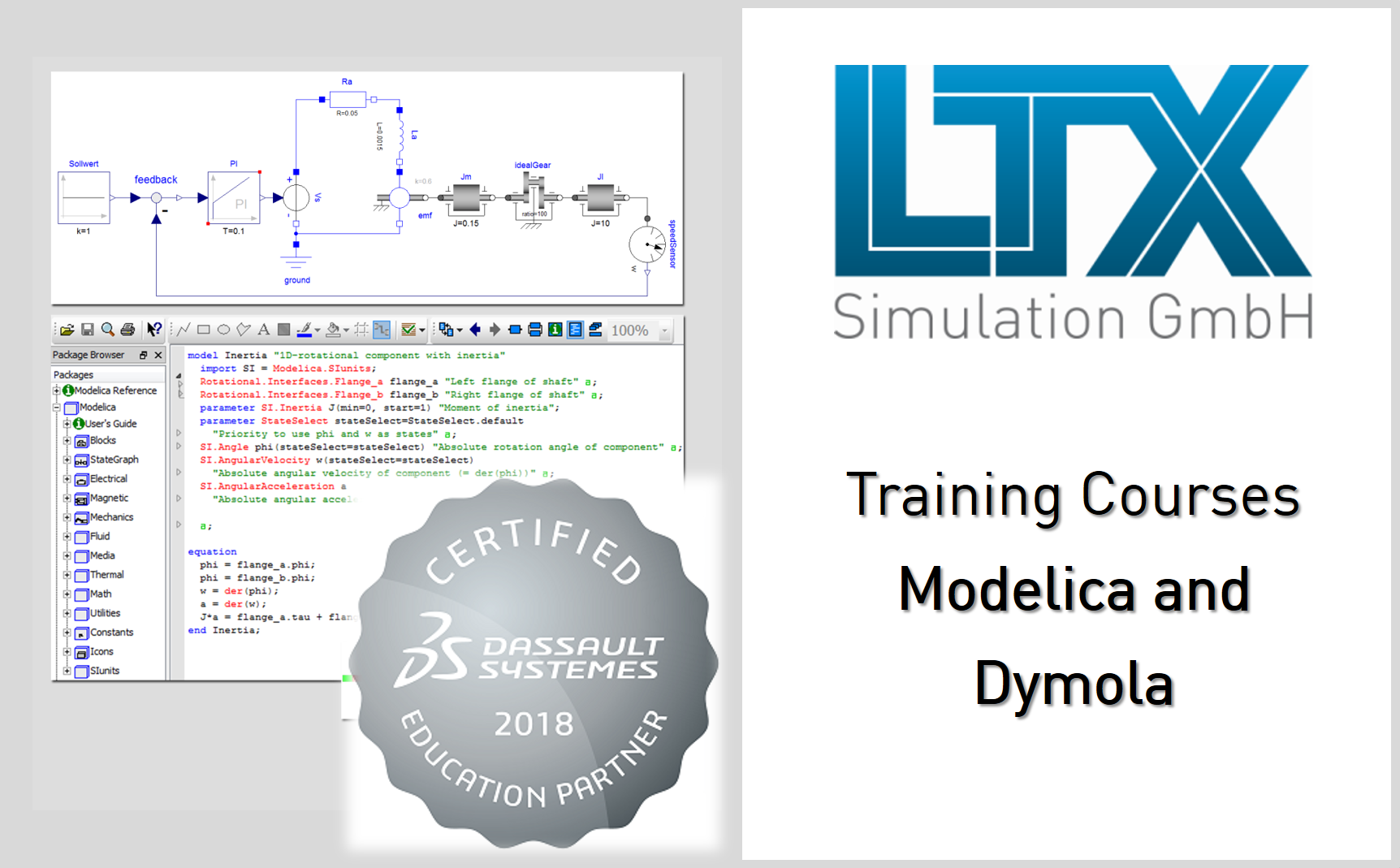
In the upcoming months, LTX Simulation GmbH offers the following two-day training classes for Dymola and Modelica in German language (in English on request) at our office in Munich:
Introduction to Dymola and Modelica (Leo Gall)
July 10 – 11, 2018
Multi-domain modeling and simulation with Modelica and Dymola (Prof. Martin Otter)
November 05 - 06, 2018
DLR Visualization Library and Modelica MultiBody (Dr. Tobias Bellmann)
November 07 - 08, 2018
We also offer in-house classes in German or English on request. If you are interested in special topics for your training (e.g. Model Calibration, OpenModelica, Modelica Synchronous State Machines), please contact us.
Please visit our website for more information or contact us at kurse@ltx.de.
This article is provided by Leo Gall LTX Simulation GmbH
Training Courses for Modelica and TIL
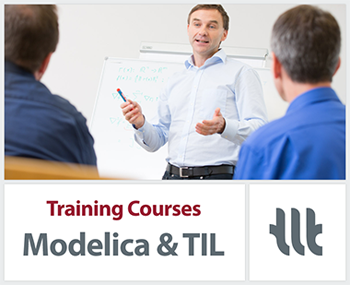
TLK-Thermo offers two day Modelica training courses for learning basic and advanced object oriented modeling. The Modelica course is an introduction to the most important features of Modelica, including numerical aspects. With many practical exercises the participants will learn how to design and implement Modelica libraries (not only within thermal science).
Furthermore, we are offering a one day course for thermal system modeling with the Modelica library TIL. The training course is directed towards simulation and modeling specialists with basic knowledge of the Modelica programming language. It can be seen as an advanced course to the basic Modelica training.
The next training course will take place in Braunschweig on 25th to 27th of September, 2018.
For further Information regarding our courses see TLK-Thermo training courses or contact us at training@tlk-thermo.com.
This article is provided by Matthias Kwak TLK-Thermo GmbH
Register for a Modelon Training Class Near You
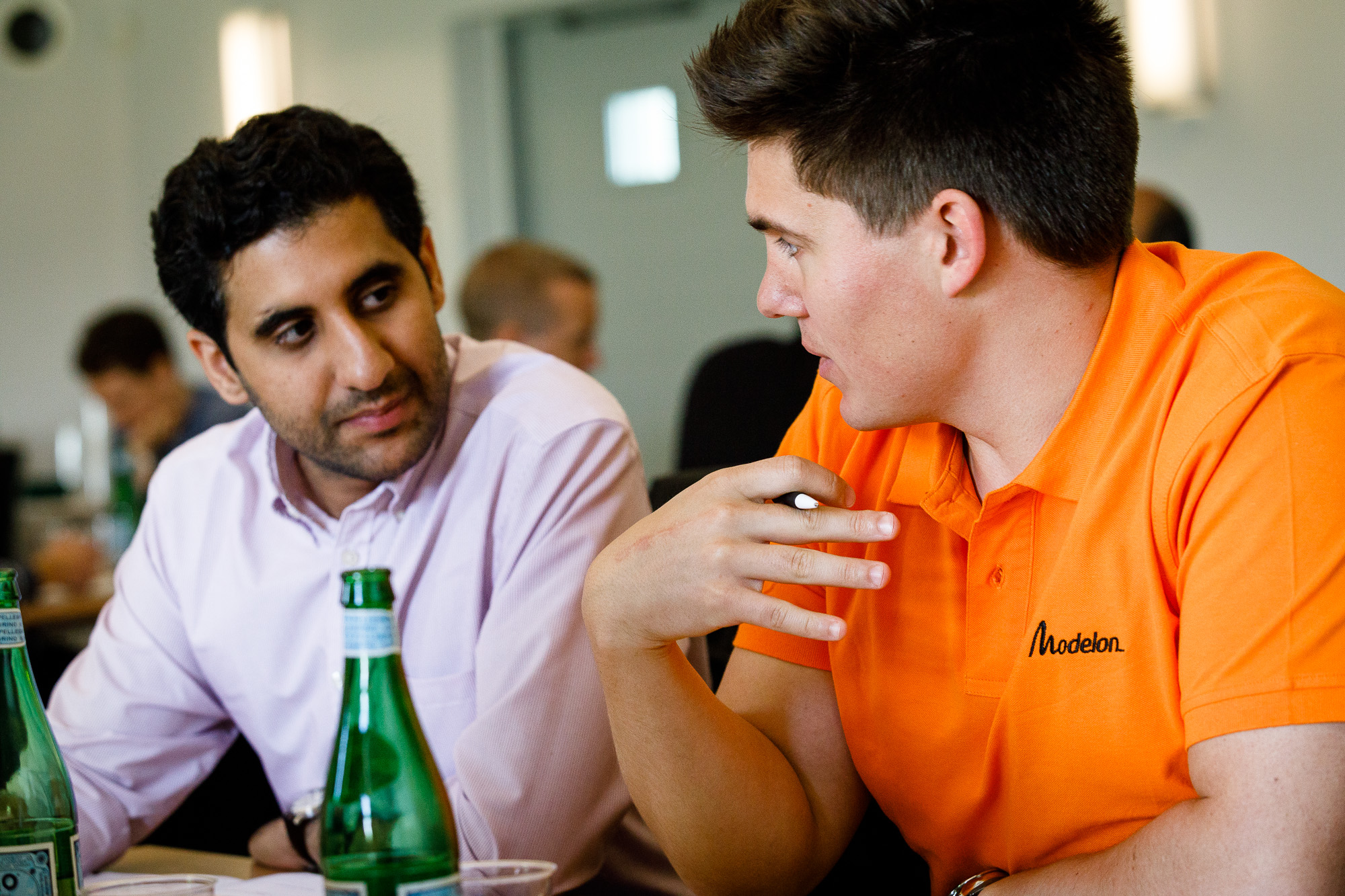 Modelon offers both customized and standard training courses for various topics such as Modelica, FMI, Dymola, and products from the Modelon Library Suite, Modelon Creator Suite and Modelon Development Suite. The courses typically include a mix of lectures, demos and exercises led by qualified field experts. Modelon’s engagement in the Modelica Association and the experiences from Modelon’s product development ensure that all Modelon training courses are up-to-date with the development of Modelica technology.
Modelon offers both customized and standard training courses for various topics such as Modelica, FMI, Dymola, and products from the Modelon Library Suite, Modelon Creator Suite and Modelon Development Suite. The courses typically include a mix of lectures, demos and exercises led by qualified field experts. Modelon’s engagement in the Modelica Association and the experiences from Modelon’s product development ensure that all Modelon training courses are up-to-date with the development of Modelica technology.
View Modelon’s training schedule to find a course near you.
Don’t see a course in the topic you’re interested in or near your location? Contact sales@modelon.com to schedule a course.
This article is provided by Swati Tyagi, Modelon